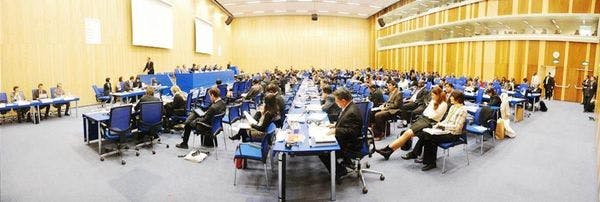Are the three drug conventions still the cornerstone of the world drug control system?
Reflections from the CND inter-sessional meeting on January 14, 2014.
UN member states are currently in the process of hammering out a ‘Joint Ministerial Statement’ for the upcoming High Level Review of the world drug response – at the Commission on Narcotic Drugs (CND) in March. At the most recent ‘inter-sessional meeting’, exasperated delegates of all ideological persuasions repeated variations of the refrain “we’ve already done this…this language is in the Political Declaration…we debated this last year…this paragraph was already settled by consensus.”
One reason for the review of previously agreed language was because new delegates were present in the room, as the membership of CND changes annually. Interestingly though, Venezuela and Argentina were among the most vocal delegations from Latin America, yet are not officially among the 53 members of CND – rather they have a right to attend as they are “States Parties” to the international drug conventions themselves.
After several marathon inter-sessional meetings in 2013, where a slightly different cohort of delegates debated contentious paragraphs of the proposed ‘Joint Ministerial Statement’, many representatives voiced disbelief that they were having to go over it all again and somehow come to a new consensus with new colleagues. This is an epic effort given the different policy blocs and ideological splits, making the task for the new Chairman – Ambassador Khaled Abdel-Rhaman Shamaa from Egypt – very challenging. The Chair actually did a good job in a tough situation, keeping the discussion moving along and punctuating it with witty quips and ironic observations. Delegates only got through 16 paragraphs (reaching an agreement on about half of these) of the 42-paragraph draft Statement (which had sub-paragraphs tacked on throughout in last years’ sessions).
Venezuela and Guatemala, whose representatives dominated the discussions, consistently commented on the length and repetitiveness of the Statement, which makes excruciating reading in English and must be even worse for non-native English speakers. They either wanted to delete entire paragraphs or to shorten the text to make it more concise. The Venezuelan delegate, who intervened on almost every paragraph, kept emphasising how “the problem has changed” and suggested a lot of new language (since the original language, based on the 2009 Political Declaration on drugs, was “outdated” and “inadequate for dealing with the contemporary problems”).
Early on in proceedings, she challenged agreed language describing the international drug conventions as the “cornerstone” of the drug control system, suggesting instead the word “framework”. This may seem like a small edit – but it opened up a lengthy debate that allowed member states to throw down markers regarding their positions on the need to either re-envision or reinforce the existing system. This debate rhetorically symbolised the ideological divides in the room. Countries wanting to retain “cornerstone” – thereby maximising the importance of the international drug conventions – were France, Canada, Russia, the UK and China. For Venezuela (and others, such as Uruguay) the word “framework” implies greater flexibility, while also acknowledging the importance of other relevant conventions and treaties (including those on human rights and public health).
At one point, Ambassador Shamaa commented that he felt “like he was participating in a literary society meeting”, as one delegate after another discussed the etymology and definitions of the words cornerstone and framework in their own languages – with Morocco pointing out that they are not synonymous in Arabic, and Guatemala referring to the structure of Mayan temples! Eventually, the delegate from Egypt came up with “foundation” as a compromise, after he checked the Arabic translations. The issue was eventually put on the shelf for agreement at a future meeting.
Although this seemingly endless haggling over words and phrases may be exasperating, for many close CND observers it reveals the true politics of the debate. The careful negotiation over words and phrases underscores the importance of the process itself to member states, including how to find consensus on a politically charged topic within an ideologically diverse transnational community. In other words, what can appear as pedantic debate also reveals that delegates believe that what they say matters and that what they say is connected to what their countries actually do vis-à-vis national and global drug policy.
For more information about the High-Level Segment, please click here or visit the CND Blog.
Keep up-to-date with drug policy developments by subscribing to the IDPC Monthly Alert.
